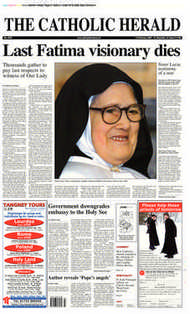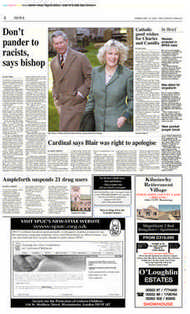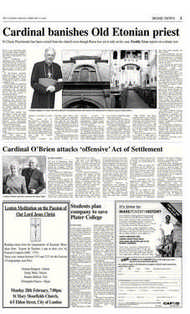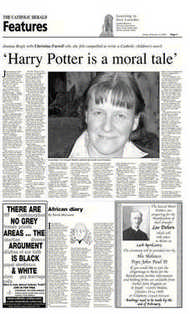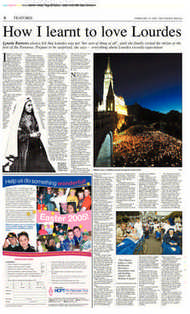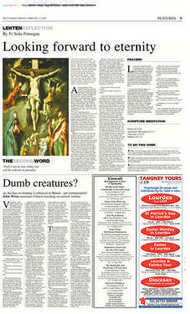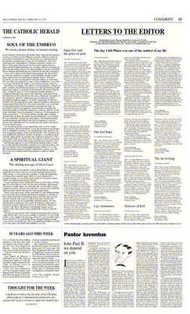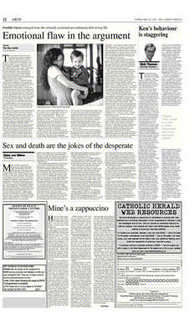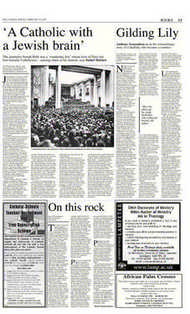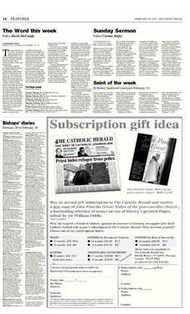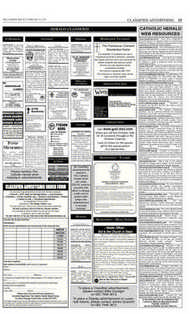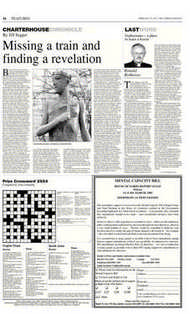Page 7, 18th February 2005
Page 7
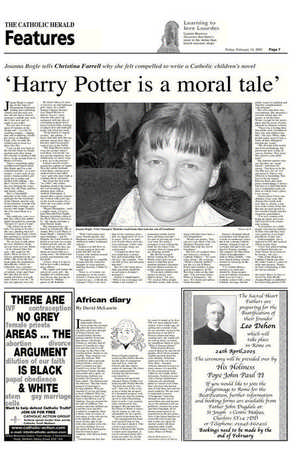
Report an error
Noticed an error on this page?If you've noticed an error in this article please click here to report it.
Tags
Share
Related articles
Publisher Probes ‘frost In May’ Copyright Claim
How Can We Hand Down The Faith To Our Children?
Catholic Bookshop Is Opened
Why Youth 2000 Works
Paperback Round-up
‘Harry Potter is a moral tale’
Joanna Bogle tells Christina Farrell why she felt compelled to write a Catholic children’s novel
Joanna Bogle is standing on the steps of Westminster Cathedral smiling and explaining volubly that the train was late and she had to borrow someone’s mobile and, well, she’s here now and we ought to get coffee.
For my sins, I’ve just spent 45 minutes in the wrong cafe – in a den of smoking iniquity – sipping latte and wondering, amidst the clouds of Marlboro Light, why on earth she would want to meet in a place like this.
I was on the way back to the Herald when we finally tracked each other down. We relocate to another Caffé Nero, on the ground floor of House of Fraser.
There’s something rather scrubbed and honest about Mrs Bogle and I’m a tad embarrassed that – as a nonsmoker – I now reek of cigarettes. Joanna politely pretends not to notice and fuelled with caffeine – she likes “decent coffee” – fires her way through the issues of the day: the Pope, politics and family values.
She’s a formidable defender of the faith, a true apologist for the teachings of the Church, and the sort of no-nonsense woman who would whip a bishops’ conference into shape. Frankly, she’d be marvellous in a crisis.
She confesses, sotto voce, that she collects the rubber bands discarded by postmen “because it’s such a waste”.
“Oh, when I’m an old lady, I’m going to be nuts,” she says, pushing back her customary alice band, which this morning is covered with Christmas teddy bears.
We are here to talk about her new children’s book, Second Term At Four Winds – to be released later this year – the sequel to We Didn’t Mean To Start A School, published in the late 1990s. She wrote the first book under the pseudonym Julia Blythe, which, on reflection, was a mistake.
“I am most well-known as a Catholic writer and I had this idea that the book would sell better if people didn’t think it was me.” In fact, the opposite was true. We Didn’t Mean To Start A School is an old-fashioned girls’ story. As a child, Joanna’s literary heroine was Darrell Rivers of Malory Towers’ fame. Anyone who grew up entranced with the idea of swimming in pools hewn from Cornish cliffs, lashings of ginger beer and midnight feasts will relish her book.
“To be honest it’s based on that,” she admits, “I know that little girls like traditional, strong story lines, but they don’t necessarily want to live in the 1950s.
“The Enid Blyton books were out-of-date when I read them. I loved the values and the traditions, but I deliberately set out to write a story set in the present.” Joanna’s novels revolve around the exploits of Auntie Win, her soldier husband Uncle Harry, and an assortment of nieces and rather “nice” girls who don’t balk at wearing cherry red berets.
She wrote the first book “in a blitz” one winter, laughing aloud at the names she was inventing. Her dashing army officer, Andrew Darrington, is named after a junior reporter she worked with years ago on the South London News when she was editor of the women’s page.
“Rupert Darrington – such a yuppie name. I used to tease him and Piers PugheMorgan [erstwhile editor of the Daily Mirror] mercilessly,” she laughs out loud, a deep throaty laugh.
The characters too, are based on real people. She is Auntie Win; Uncle Harry is Jamie Bogle – Joanna’s barrister husband – and Fr Higgins, the Latin teacher, is based on at least two young London priests, and no, she won’t tell me who they are.
“Andrew Darrington is Jamie as I knew him as a young man,” she flutters her eyelids and bashfully tilts her head.
“I know what it is like to fall in love with a dashing army officer.” The sequel will feature the arrival of a new girl – the daughter of a famous pop star. Go on, this just has to be based on “Madge” – queen of the Kabbala. “Well, I did realise how many famous people, like Madonna, tend to send their children to rather traditional schools.” Joanna is in full flow so I’m not going to press the point that this was the woman who strutted around in her underwear.
“My pop star is a sensible woman and she wants her daughter to wear uniform, and play lacrosse. I think it’s a hoot.” There is, of course, no impropriety in the books. Joanna’s young men come round for tea... without the crumpet. There’s no men tion of the morning-afterpill; no suggestion of sexual angst. This is an innocent world where girls discuss marriage; where salacious teenage mags are confiscated.
“I wanted to show that you could have a strong boy–girl relationship without sex,” she explains. “You can fall in love and not jump into bed.” But isn’t she being just a little unrealistic about the sexual mores of today’s teenagers?
Joanna is unapologetic. “Well, I was a teenager and I think I am realistic. I remember terrible family rows and huge tensions – it’s part of growing up. I feel very sorry for today’s teenagers; I was writing the book for me when I was younger. Not all young girls are sleeping around.” She did her research before starting the Four Winds series and was saddened to find that most modern children’s literature focused almost entirely on reality, and not escapism.
“If you deny children the chance to dream, you deprive them,” she says. “It’s wicked. Most people who have really done some thing with their lives have a rich imagination.
“Books can inspire. They can give you ideas. I bet you Margaret Thatcher read books that took her out of Grantham.” Her love of escapism does not, however, extend to Catholic Tolkien – “It’s such a boy thing,” she exclaims. “What’s a bloody hobbit?” – but she is a fan of Harry Potter and considers it priggish to disapprove of J K Rowling’s take on the dark side. “I do not sense Harry Potter as dangerous,” she says. “It’s moral and upbeat. Good triumphs.” Joanna’s fictional school, in common with Hogwarts, is built on traditional values, but it has a strong Catholic identity: religion is part of everyday life and is not confined to Sunday worship. She supports the Herculean efforts of headteachers – such as Marie Stubbs – who have turned failing schools around by focusing on the numinous.
“I’ve written about a school as it could and should be. Some people, even in Catholic education, think you can’t run a Catholic school with a clear Catholic message, but the public wants it: tradition and structure complemented with religion.” Her own education was conventional. She attended a convent school, not, she insists, at all like Four Winds, except for the atmosphere and the sense of order inherent to religious schools.
“There was a feeling then that adults were confident in their role and children like that,” she says.“Many older people today seem to lack a sense of their obligation towards the young.” “We all want to be trendy and forward-thinking, but grown-ups have a duty of care to children. They need, they deserve your adulthood.” She distrusts parents who say that they are “good friends” with their offspring. “You have to be the one that says ‘no’ or ‘yes’ and mean it. That is very different to friendship. You have to be the barrier between them and some pretty horrid things. I always felt sure as a child that there was a wonderful world out there in which I had a place. I was secure.” Joanna doesn’t have any children of her own. She chooses her words with care; this is, clearly, a sadness at the centre of her life. She has devoted herself to her extended family and her numerous godchildren.
“I’m very content with being an auntie and I consider myself to be a fortunate woman.
“I remember, as a child, people who had no children of their own and they were very good me. I see God’s providence in this way.” Understandably, she is opposed to IVF and medical efforts to play God.
“I feel very glad to belong to a Church that tells me what I know in my heart to be wrong,” she says.
“One of the things the Catholic Church can offer the wider world is a sense of order and mystery. Things do have a beginning, a middle and an eternity.”
blog comments powered by Disqus


